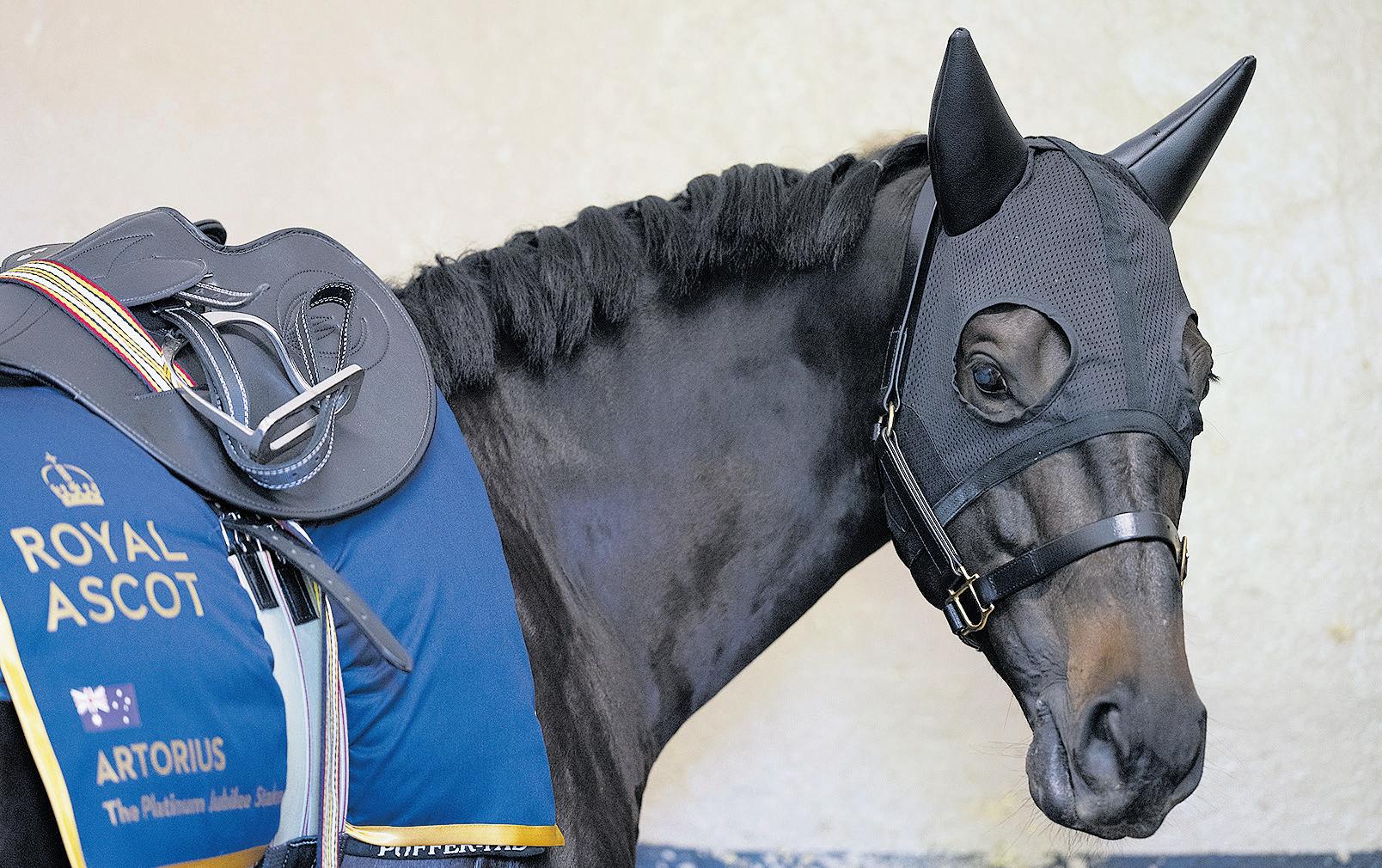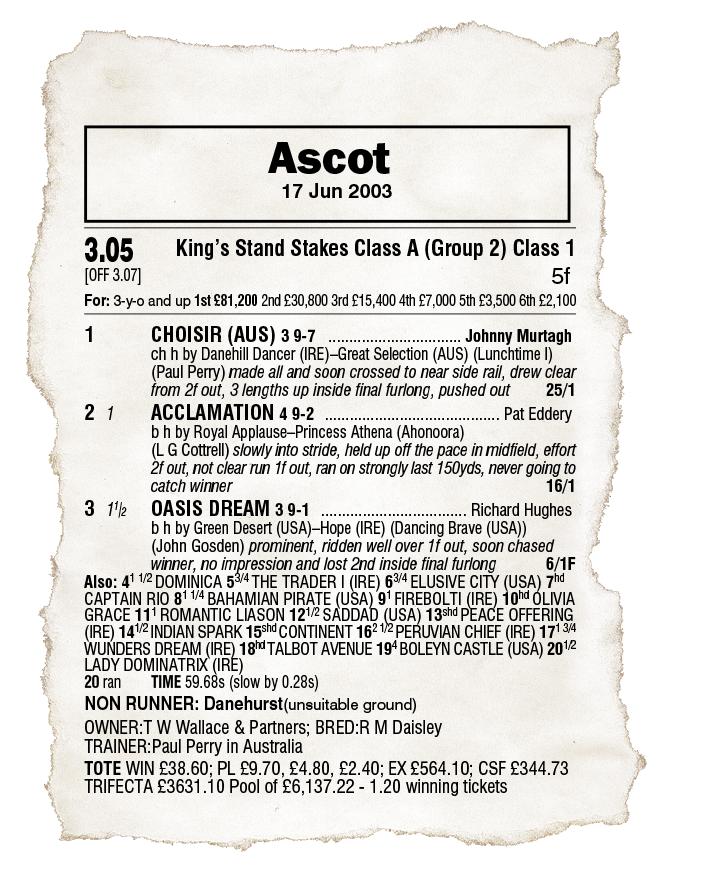
8 minute read
Sprint sensation who paved the way for the next generation of Australian greats
rider at Royal Ascot, Murtagh had got to know Perry when riding for Peter Myers in Australia during the Irish off-season in his days as an apprentice.
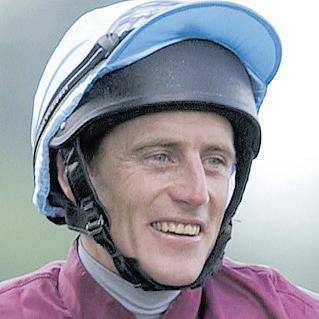
good as Falvelon, an Aussie sprinter who had won in Hong Kong, to which he got the reply: “He’ll be much better than him.”
AGROUND-BREAKER, a pioneer, a global phenomenon. Choisir achieved the unthinkable feat by winning Royal Ascot’s two major sprint prizes in the same week 20 years ago and, while he was lauded at the time for sending shockwaves through the sport, the legacy of his heroics in the intervening years has been even more seismic.
The enormous sprinter paved the way for future generations of Australian greats to grace the royal meeting, most memorably the mighty Black Caviar. He altered the global landscape by proving southern hemisphere horses could travel to Europe and conquer the best the continent had to offer.
On the cricket field or rugby pitch, Australian sporting success in Britain had been commonplace, but not on the late Queen’s racetrack.
Choisir was not only the first Australian winner at Royal Ascot, but the first anywhere in Britain when he crossed the line in front in the 2003 King’s Stand Stakes. Just four days later, he emphatically rewarded the madcap enterprise of connections by winning the Golden Jubilee Stakes as well.

Fate played its part in one of the most pivotal moments in the long history of Royal Ascot. Choisir had been bound for Singapore and the Krisflyer Sprint until the race was cancelled at the last minute. It forced a rethink and required a trainer up for a challenge. Step forward Paul Perry.
“We were going to Singapore and they had the Sars virus and the races were called off, so international agent Jack Petley asked if we’d go to Ascot. He was dressed up ready to go so I thought, ‘why not?’,” Perry (above) says.
“I’d been to Ascot before as a spectator but never with a horse. I thought he had a great chance as he was thriving at the time. We’d raced against English horses in Hong Kong and they had performed pretty poorly, so that gave me added confidence.”
At the time, the King’s Stand was still a Group 2, meaning Choisir, as the winner of the Group 1 Lightning Stakes, had to carry a 5lb penalty. Furthermore, given that he was foaled only in September 1999, he was still a three-year-old according to southern hemisphere rules, but as this was a northern hemisphere race he was judged to be a four-year-old and therefore allotted a four-year-old’s weight.
“He had to travel a long way but he was a good straight-course horse – he loved Flemington as well – and his form in Australia was first class,” says Perry. “It was a big hurdle for a young three-year-old from Australia and he had to carry the weight difference over there. Thankfully he was a big, powerful horse – the sort of horse for it.”
Despite an arduous journey with multiple stops, a far cry from the slick travel arrangements of today, Choisir settled into his new surroundings quickly and a sparkling piece of work on the Limekilns in Newmarket put him spot-on for the assignment.
With all the elements in place, confidence was growing in the Choisir camp. Outside of it, though, the strangers had barely raised an eyebrow.
Ascot’s Nick Smith, who now fulfils the role of director of racing, recalls: “The credit for the venture lies with Nick Cheyne, the former clerk of the course here. He was the leading force in trying to break down boundaries with horses outside of Europe and the overall internationalisation of Royal Ascot.
“There had been international horses at Royal Ascot before but very sporadically and the trip that led to Choisir coming was the first of its type. Nick had purposely gone out to Australia to throw a few balls at the stumps, so to speak. At that time hardly anyone in Australia knew anything about British racing, and vice versa, other than the Brits knew about the Melbourne Cup.”
CHOISIR flew into the King’s Stand totally under the radar despite those closest to the horse being open about their lofty expectations. There had been the talk – “he’s a monster of a horse, like a Brahma bull, and I expect him to be hard to catch,” said Perry’s son and assistant Shannon – but it was not until Choisir appeared in the parade that people started to believe it.
There had nearly been a last-minute hitch as Murtagh had a fall in the previous race and only just made it back to the weighing room in time. Having dusted himself down, the Irish jockey asked Perry whether Choisir would be as

The sheer brute strength of Choisir that day stayed with his rider, too. Going to the start, Murtagh remembers his mount being so strong his “arms ended up like Popeye’s”. Choisir was still allowed to go off at a relatively unconsidered 25-1 and Murtagh might have thought that price was about right as the speedball got warm and proved a handful. As soon as the stalls opened, though, he was quickly into his stride and his 19 rivals didn’t see which way he went.
The maximum weight of 9st 7lb mattered not a jot as the jockey had the luxury of easing down to win by a length from Acclamation. Part one of a long-priced betting coup by Perry and owner Terry Wallace had been landed.

“He looked the winner a long way out in the King’s Stand,” the New South Wales trainer says. “I was there with Terry, he was in a lot of horses and we raced quite a number of good ones, and he enjoyed it. I think everyone did quite well out of it.
“Straight after the race, we said he’d go again on the Saturday. He was the sort of horse you could do that with. I knew the run on Tuesday would top him right up as he was a big, gross, heavy horse and it would have done him the world of good.
“The interest really grew back home and I was getting hundreds of messages, which was good because you knew you’d achieved something.”
Smith was among those left aghast by the King’s Stand result and the unconventional route of turning back out again later in the week.
“When they said they were coming back on Saturday, everyone was like, ‘excuse me, you’re doing what?’” he remembers.
“The bandwagon started rolling with huge momentum building towards the Golden Jubilee.
It was a huge story – one of the biggest in global horseracing. As the race got closer, you could see how confident they were. He was the first Australian horse to travel to the UK, to win first time up was remarkable, and then to make history by winning twice was going to be phenomenal.”
The Golden Jubilee was an almost carbon-copy procession, the only difference being Murtagh (left) masterfully edging his mount left from a far side draw to the stands’ rail.
Once Choisir got to the rail he kicked on again to finish half a length clear of Airwave to become the first horse since Stanerra in 1983 to win twice at the same royal meeting.
“It was a great win against a good field in the Jubilee,” says Perry. “Airwave was the filly of the time and to beat her was a good effort. Johnny knew what he was doing and put a lot of work into it. Once again, it all unfolded really well and it was a great feeling knowing you had a great chance all the way through.”
The BBC’s Australian commentator Jim McGrath was as delirious as everybody else. As Choisir crossed the line, he proclaimed, “Step aside Phar Lap!” History was unfolding before everybody’s eyes but people could scarcely believe what they were seeing.
Perry was floating on cloud nine, and receiving congratulations from Her Majesty after the Golden Jubilee was the icing on the cake.
“It was a big thing and we went on to meet the Queen,” he says. “It was really good. She said how lucky we were winning the two races at her carnival as she mentioned she’d had five runners and hadn’t won a race. She made everyone feel comfortable and it was very special.”
CHOISIR’S in racing royalty had been assured.
It was only in the following years that the magnitude of what he achieved in breaking down boundaries on the international stage really sank in.
“If it wasn’t for Choisir, would we even be where we are today? It probably would have come but he didn’t half accelerate it,” says Smith. “Then came Takeover Target, Miss Andretti, Scenic Blast and others before the crowning moment with Black Caviar.
“The golden era all started with Choisir. He would be one of the most important racehorses of all time, in terms of breaking boundaries and
“The importance of results like that can’t be overstated. Choisir went on to become a Coolmore stallion, so you had the world’s leading stallion operation interested in the Australian side of things, opening up opportunities to run horses in both continents. It all started with Choisir and we were very fortunate.”
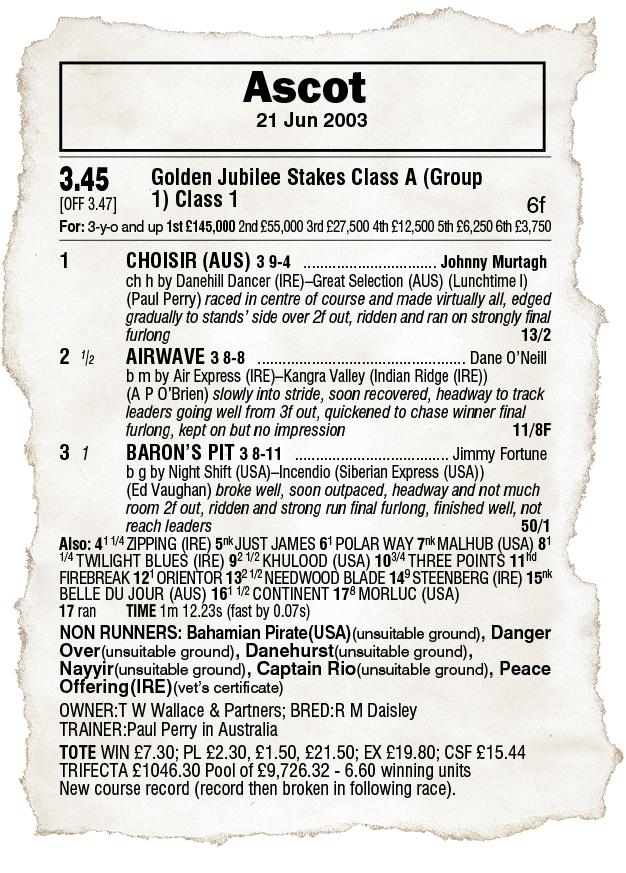
Perry returned with another Lightning winner in Fastnet Rock. The experience second time around could not match the first and it highlighted just what an exceptional horse Choisir had been.
“We took Fastnet Rock two years later and he got a bit of travel sickness and everything went wrong with him, otherwise he’d have also won,” says Perry. “With Choisir, he was a lovely, straightforward horse. You knew he’d travel on the plane, eat when he’d got there and work out there. He was the right horse for the job.”

Perry takes great pride in opening the Royal Ascot door for Australia and other countries. His actions have led to the royal meeting becoming racing’s version of the Olympics, where non-European countries have won a total of 22 races. Australia has been responsible for seven of those and many more will come thanks to Choisir.
“It’s quite common now and it’s been good,” says Perry. “He’s been a good stallion down here and proved to be a good sire of broodmares too. He’s no longer with us but he was a damn good horse.”
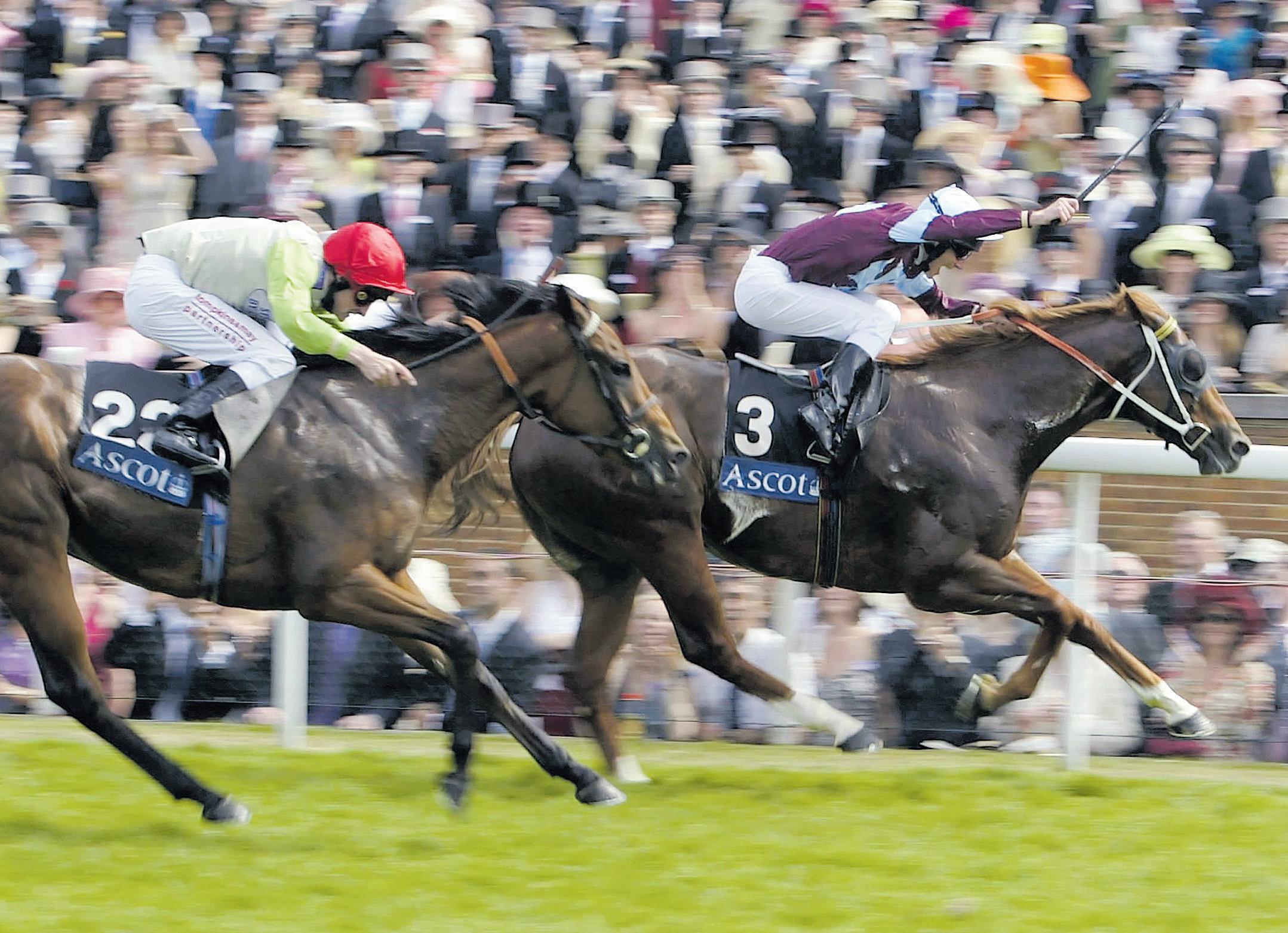
CHOISIR 20 YEARS ON THE FLOOD OF AUSTRALIAN SUCCESS THAT FOLLOWED
ROYAL ASCOT is clearly back on the radar for Australia’s elite sprinters, who attempt to build on the record of their illustrious predecessors on the 20th anniversary of Choisir’s groundbreaking double at that meeting in 2003.
Buoyed by the triumph of Nature Strip in last year’s Group 1 King’s Stand Stakes, the great challenge from down under is up and running again after lying dormant for nearly a decade. Heading the attack this year are the brilliant Coolangatta and proven Ascot campaigner Artorius, and they are backed up by Cannonball and The Astrologist.
Coolangatta, a multiple Group 1 winner, has the perfect profile as she comes to Britain off the back of a stunning victory in the Group 1 Lightning Stakes at Flemington, the five-furlong race won by all six Australian-trained winners at the royal meeting.
Choisir (2003), Takeover Target (2006), Miss Andretti (2007), Scenic Blast (2009), Black Caviar (2012) and Nature Strip (2022) all tasted success in the Melbourne weight-for-age sprint, first run in 1955 and a race boasting a rich history.
Black Caviar returned to Australia after her heart-stopping victory in the Group 1 Golden Jubilee Stakes and won the Lightning a third time, after which Victoria Racing Club officials attached her name to the race title in recognition of her career achievements.
